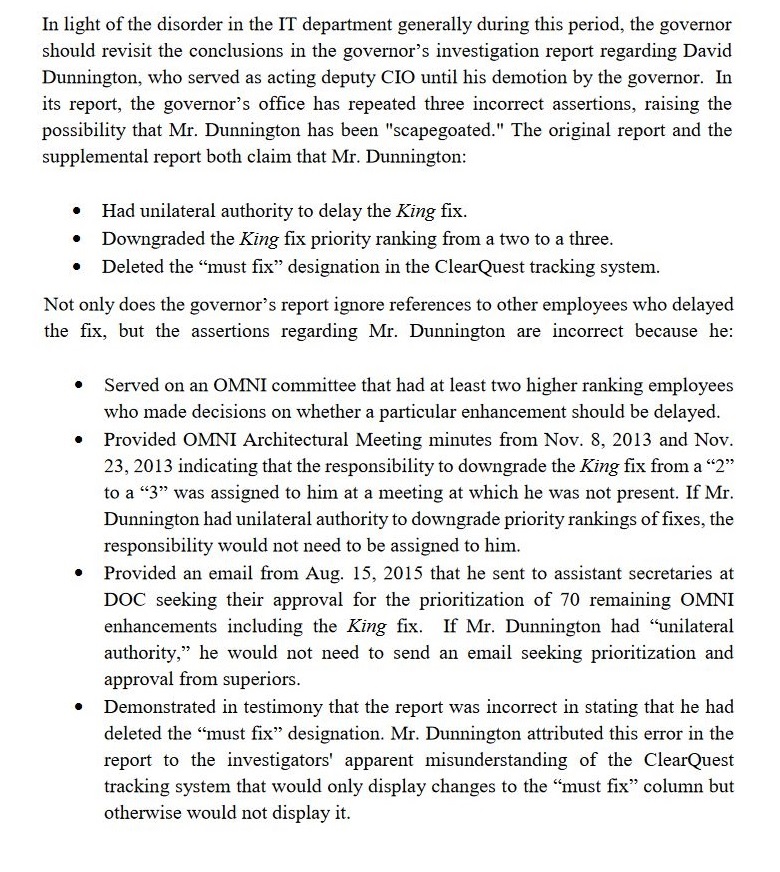OLYMPIA – A year after a Senate investigation concluded the early release of 3,000 violent and dangerous prisoners was due to pervasive mismanagement at the Department of Corrections, a new decision by a state board confirms one of its central findings, lawmakers said Wednesday.
The state Personnel Resources Board this week overturned the permanent demotion of an information technology worker who had been singled out for blame by the governor’s office. Last year IT business manager David Dunnington was one of several mid-level DOC employees punished in the wake of the scandal. The Senate Law and Justice Committee conducted an extensive investigation and found that Dunnington was being unfairly scapegoated.
On Tuesday the personnel board reached the same conclusion about the Dunnington case. Both found Dunnington was not solely responsible for the delay, and that he did not remove a “must-fix” designation for the repair work, as investigators for Gov. Jay Inslee claimed.
“David Dunnington was a fall guy for a troubled state agency,” said Sen. Mike Padden, R-Spokane Valley, chair of the Senate Law and Justice Committee. “The decision of the state personnel board shows the governor’s investigators got it wrong, and we were on the right track when we said the problems started at the top. The decision also underscores the urgent need for the Legislature to pass reform legislation this year.”
The Senate’s comprehensive report on the matter, released a year ago, disputed the conclusions of investigators hired by the governor’s office. It observed that Dunnington did not have unilateral authority to delay the software fix, and that the “must-fix” designation was never deleted. Investigators for the governor’s office did not see the designation because they misunderstood the way the way the software-fix tracking system operated. The Senate committee concluded the real problem was a systemic breakdown of department management and oversight from the governor’s office, and that blame lay with top-level agency managers who did not treat the releases as a major concern.
The early releases of prisoners took place over 13 years until the software was finally fixed. Incorrect calculations by agency computers affected prisoners who received sentence enhancements for crimes involving weapons and sexual violence. Though the Department of Corrections learned of the problem in 2012, the fix was delayed three years. Nearly half of the prisoners were released after the problem was discovered, and at least 29 went on to commit new crimes when they should have been behind bars. Two deaths have been linked to the improperly-released felons, and a $5 million claim already has been filed against the state in the death of a Moses Lake man.
A bill in this year’s Legislature would enact the committee’s recommendations for reform of the department. Senate Bill 5294 has yet to receive a vote in the House. Among its provisions is a requirement that DOC calculate sentences by hand when it has reason to believe computers are providing inaccurate results.
“Last year we faced much criticism when the Senate Law and Justice Committee chose to investigate this breakdown at Corrections,” said Sen. Steve O’Ban, R-University Place, who helped lead the Senate investigation. “The personnel board’s review of the case demonstrates the importance of our independent investigation. The governor’s office was eager to blame mid-level workers and absolve upper managers whom the governor supervises. We’ve said all along that the buck doesn’t stop in the middle.
“I’m disappointed the governor has chosen to continue to appoint new leadership from within DOC when it’s so clear that major cultural reform is needed.”
In its report last year, the Senate committee observed that inaccurate assertions made by the governor’s investigators raise “the possibility that Mr. Dunnington has been ‘scapegoated.’”
Tuesday’s ruling by the personnel board reinstates Dunnington as an IT business manager. The board decided that Dunnington should have made further inquiries about the nature of the problem, but his one-year demotion was sufficient and should not be made permanent. The board found that Dunnington did not change the “must-fix” designation or reduce the priority of the fix, and that it was delayed by a consensus decision of Corrections IT managers, not by Dunnington himself, as the governor’s report claimed. The decision concludes that the Department of Corrections did not demonstrate just cause for a permanent demotion.
The following passage, from pages 55 and 56 of last year’s Senate report on the early release scandal, identified inaccurate assertions made by investigators hired by the governor’s office, and raised the possibility that David Dunnington was being unfairly scapegoated:











